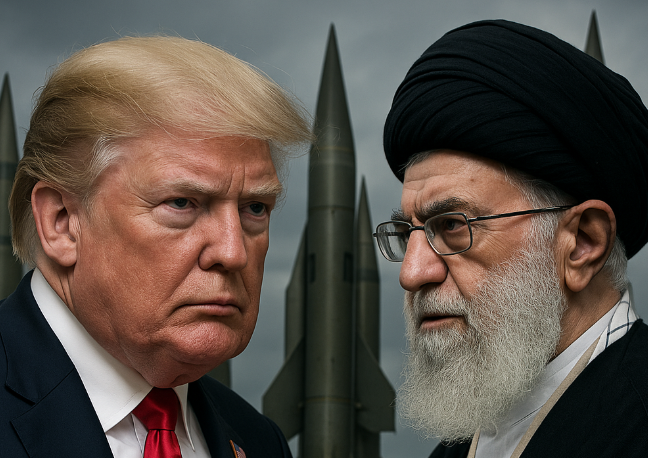Iran Launches Mega Attack on US Bases in Middle East:Massive escalation unfolds in the Middle East as Iran launches a large-scale missile attack on US bases in Qatar, Bahrain, Kuwait, and Iraq, following the recent US strikes on Iranian nuclear sites. Explosions rock Doha as dozens of missiles target American forces, while air raid sirens sound across Gulf capitals. Qatari air defenses intercept missiles aimed at Al Udeid Air Base. Operation “Besharat al-Fatah” marks Iran’s direct response, raising fears of a wider regional conflict.
Iran Launches Mega Attack on US Bases in Middle East Following US Attack on Iranian Nuclear Sites
The Middle East is once again on the brink of a full-scale conflict after Iran launched a massive and unprecedented missile attack on multiple US bases across the Gulf region. This major escalation comes just a day after the United States targeted and destroyed several Iranian nuclear facilities in a dramatic overnight airstrike. The Iranian retaliation, which appears to have been carefully coordinated, has now pushed regional tensions to a dangerous new level.
The capital city of Qatar, Doha, was rocked by multiple explosions as dozens of Iranian missiles rained down on sites believed to be housing American forces. Israeli media reported that Iran had launched at least six missiles specifically targeting US bases in Qatar. Eyewitnesses in Doha described scenes of chaos as Iranian missiles penetrated Qatari airspace and struck with unprecedented force.
Despite the heavy barrage, reports confirm that all seven initial missiles launched — six aimed at US positions in Qatar and one towards a US site in Iraq — were successfully intercepted.
In a separate statement, the Qatari Ministry of Defense confirmed that Qatari air defenses successfully intercepted a missile attack targeting the Al Udeid Air Base. However, the Ministry did not specify the source of the attack, leaving questions about whether this particular strike was part of the broader Iranian operation.
Meanwhile, Iranian Foreign Minister Abbas Araghchi has arrived in Russia to brief President Vladimir Putin about the missile strikes on US bases in the Gulf. This development suggests that the decision for these strikes had been made and coordinated as early as yesterday, highlighting a calculated and deliberate Iranian response.
Iranian state television officially announced the beginning of “Operation Besharat al-Fatah,” a large-scale military response aimed at US bases across the Gulf. The operation involves both the Iranian Revolutionary Guards and the Iranian Army working together in a joint offensive. As part of this operation, additional Iranian ballistic missiles were launched targeting US bases in Iraq, Kuwait, Bahrain, and potentially even further across the Gulf.
The skies over Iraq were eerily empty just moments before new waves of Iranian ballistic missiles surged towards American positions. Meanwhile, air raid sirens began blaring in the Bahraini capital, Manama, as intelligence sources warned of imminent strikes.
Bahraini authorities issued an urgent advisory stating: “Sirens sound. Citizens and residents are urged to head to the nearest safe place.” Kuwait, Bahrain, and the United Arab Emirates braced themselves for possible incoming attacks as Iran repositioned additional missile launchers in preparation for further strikes.
In response to the unfolding crisis, several Gulf nations took immediate defensive actions. The United Arab Emirates officially closed its entire airspace, while Saudi Arabia followed suit, sealing off its skies amid the escalating threat. UAE and Saudi air defense systems engaged Iranian ballistic missiles in the air as multiple warheads threatened to penetrate regional defenses.
As part of the larger offensive, Iran reportedly fired ten missiles directly at US targets in Qatar during one particularly intense wave of the attack. The full scale of the damage remains unclear at this hour. However, the Israeli publication Yedioth Ahronoth has reported that US bases not only in Qatar but also in Bahrain and Kuwait have been subjected to violent missile bombardments from Iranian forces.
The Iranian Armed Forces have declared that the response operation has only just begun, raising serious fears of a wider war involving the entire region. This major Iranian strike was widely anticipated after the US’s dramatic overnight bombing of Iran’s key nuclear sites just one day earlier, a move which severely damaged Iran’s nuclear infrastructure and infuriated Tehran’s leadership.
Now, with Operation Besharat al-Fatah underway, the fragile balance in the Middle East stands at its most dangerous point in years.
The coming hours and days are expected to be critical, as the world watches how the United States and its allies will respond to this Iranian show of force. With airspaces closed, sirens blaring, and regional militaries on high alert, fears are growing that this confrontation could spiral into a much larger and more devastating conflict.

